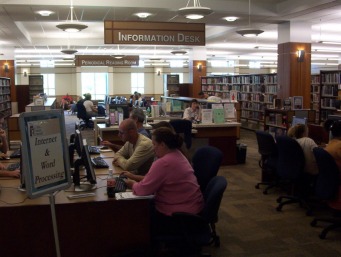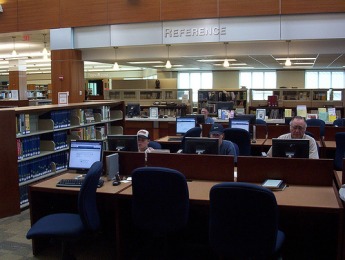Developing Career Resources in Public Libraries
Learn by Example: What Other Libraries are Doing
Although many libraries are engaging in some kind of career-help, the depth and form this takes can be very different. Examples range from offering a one-time resume workshop, having regular computer training classes, or hosting a full-blown career fair. This section highlights the different kinds of services being performed by libraries across the country. The list is by no means exhaustive, but it seeks to give a range of examples from different sizes of libraries in different parts of the country.
Whetting your appetite
Davenport Public Library (Iowa)
During the recent recession, the Davenport Public Library in Iowa was facing pressure of across the board cuts from the city. However, according to a Quad-City Times article, the library had a few simple ideas in place to help those looking for a career. One option was to reserve a librarian for one-on-one help, which could involve computer training or resume review. The library also had sample job applications so people could practice before turning in the real thing (Tibbetts, 2009).
Omaha Public Library (Nebraska)
A branch of the Omaha Public Library took on a more ambitious project by hosting a career fair in the library parking lot. According to Bernardi (2005), the library serves an inner-city, low-income population and the main use of library computers was to look for jobs.
“Employers enjoy being so close to the library because they can refer people inside to apply online and prepare resumes. We work closely with the circulation managers of The Employment Guide and JobDig, local employment publications," (Bernardi, 2005, p. 322).
Bernardi (2005) says the career fair gave the library an advantage in the state legislature when it was time for the budget to be developed because legislators had a tangible example of how the library was serving community needs.
Career-Help on the Web
The key to most of these "role model" sites is content, not flashy design. Job-seekers are looking for information that is easy to find and understand (Gronowska, 2009). It is worth noting that many people do not have online access and will not be able to get to these sites from home. Libraries should also think about developing print resources for those without internet access.
Riley Guide
http://www.rileyguide.com/execute.html
Developed by librarians, this guide is comprehensive; covering internet job searches, resumes and salaries. Started in 1994, the site is updated regularly. This is a professional resource for both librarians and patrons. The website is section 508 compliant, so it is also compatible with adaptive technologies. The guide includes information on copyright of its articles and contact information.
Long Branch Public Library (New Jersey)
http://www.lmxac.org/longbranch/Virtual%20Career%20Center%20Template/index.html
The New Jersey Library has pulled together resources for all types of job-seekers, including Hispanics, the disabled, ex-offenders, teens and seniors. There are links to local government and local education opportunities and a clearly marked section of library resources, including helpful databases. Opportunities to sign up for one-on-one help with a librarian seems to be popular at many libraries. This site is not just for those who are out of work though. It includes information for working parents and women in the workplace. New Jersey libraries had a lot of resources to drawn on. The state library was a go-to place for how to build a career-help site and it partnered with workforce development to train public librarians in e-government (McCarthy & Tumulty, 2010).
Mississippi State University
http://guides.library.msstate.edu/economic_crisis
Although developed by an academic library, this guide could be a rubric for how to create a comprehensive resource. Mississippi State University links to national, state and local resources for career. They also provide a broader context from which to understand the financial crisis. Some of the information is technical and legal and the volume of information found here can be overwhelming, but it gives more examples of what could be included in a job-seeking guide.
Anne Arundel County Public Library (Maryland)
http://libguides.aacpl.net/content.php?pid=53133&sid=402413
The Baltimore area library has developed a libguide for job-seekers. It includes information on classes being held at the library, how to get live chat help and advice on how to research potential employers. The site is simple and easy to use--some of the resources are local but some cover a broader area. It may also be worth looking at how AACPL has set up live chat help.
Boulder Public Library (Colorado)
http://research.boulderlibrary.org/jobs-careers
The Boulder Public Library has also created a specific section on its website for job-seekers. This one clearly lists what the library can do and collates resources, including books, for people to look at. One interesting feature is a collection of RSS feeds for current job openings in the Boulder area.
Tough Times, Library Lifelines (Michigan)
http://research.boulderlibrary.org/jobs-careers
In Michigan, several libraries banded together to create one broader resource. It lists both individual library programs and other places to find aid.
Straight from ALA
ALA Editions' Crisis in Employment: a Librarian's Guide to Helping Job Seekers (Jerrard, 2009) has several best-practice examples for libraries of every size. Just a few will be unpacked here.
The list of examples could go on forever, but this should give public librarians a place to start. To read more about any of these case studies, visit the References page. The Resources for Librarians page also highlights helpful guides for those looking to start something at their library.
Whetting your appetite
Davenport Public Library (Iowa)
During the recent recession, the Davenport Public Library in Iowa was facing pressure of across the board cuts from the city. However, according to a Quad-City Times article, the library had a few simple ideas in place to help those looking for a career. One option was to reserve a librarian for one-on-one help, which could involve computer training or resume review. The library also had sample job applications so people could practice before turning in the real thing (Tibbetts, 2009).
Omaha Public Library (Nebraska)
A branch of the Omaha Public Library took on a more ambitious project by hosting a career fair in the library parking lot. According to Bernardi (2005), the library serves an inner-city, low-income population and the main use of library computers was to look for jobs.
“Employers enjoy being so close to the library because they can refer people inside to apply online and prepare resumes. We work closely with the circulation managers of The Employment Guide and JobDig, local employment publications," (Bernardi, 2005, p. 322).
Bernardi (2005) says the career fair gave the library an advantage in the state legislature when it was time for the budget to be developed because legislators had a tangible example of how the library was serving community needs.
Career-Help on the Web
The key to most of these "role model" sites is content, not flashy design. Job-seekers are looking for information that is easy to find and understand (Gronowska, 2009). It is worth noting that many people do not have online access and will not be able to get to these sites from home. Libraries should also think about developing print resources for those without internet access.
Riley Guide
http://www.rileyguide.com/execute.html
Developed by librarians, this guide is comprehensive; covering internet job searches, resumes and salaries. Started in 1994, the site is updated regularly. This is a professional resource for both librarians and patrons. The website is section 508 compliant, so it is also compatible with adaptive technologies. The guide includes information on copyright of its articles and contact information.
Long Branch Public Library (New Jersey)
http://www.lmxac.org/longbranch/Virtual%20Career%20Center%20Template/index.html
The New Jersey Library has pulled together resources for all types of job-seekers, including Hispanics, the disabled, ex-offenders, teens and seniors. There are links to local government and local education opportunities and a clearly marked section of library resources, including helpful databases. Opportunities to sign up for one-on-one help with a librarian seems to be popular at many libraries. This site is not just for those who are out of work though. It includes information for working parents and women in the workplace. New Jersey libraries had a lot of resources to drawn on. The state library was a go-to place for how to build a career-help site and it partnered with workforce development to train public librarians in e-government (McCarthy & Tumulty, 2010).
Mississippi State University
http://guides.library.msstate.edu/economic_crisis
Although developed by an academic library, this guide could be a rubric for how to create a comprehensive resource. Mississippi State University links to national, state and local resources for career. They also provide a broader context from which to understand the financial crisis. Some of the information is technical and legal and the volume of information found here can be overwhelming, but it gives more examples of what could be included in a job-seeking guide.
Anne Arundel County Public Library (Maryland)
http://libguides.aacpl.net/content.php?pid=53133&sid=402413
The Baltimore area library has developed a libguide for job-seekers. It includes information on classes being held at the library, how to get live chat help and advice on how to research potential employers. The site is simple and easy to use--some of the resources are local but some cover a broader area. It may also be worth looking at how AACPL has set up live chat help.
Boulder Public Library (Colorado)
http://research.boulderlibrary.org/jobs-careers
The Boulder Public Library has also created a specific section on its website for job-seekers. This one clearly lists what the library can do and collates resources, including books, for people to look at. One interesting feature is a collection of RSS feeds for current job openings in the Boulder area.
Tough Times, Library Lifelines (Michigan)
http://research.boulderlibrary.org/jobs-careers
In Michigan, several libraries banded together to create one broader resource. It lists both individual library programs and other places to find aid.
Straight from ALA
ALA Editions' Crisis in Employment: a Librarian's Guide to Helping Job Seekers (Jerrard, 2009) has several best-practice examples for libraries of every size. Just a few will be unpacked here.
- Nappannee Public Library (Indiana): In a worst case scenario, the Nappanee Public Library in Elkhart County, Indiana was recovering from an F3 tornado when the recession hit. Soon they had the highest unemployment rate in the country (Jerrard, 2009). Librarians found traditional career-help models were only treating the symptoms, so they started a Long-Term Recovery task force that included organizations from several townships and the public library. Weekly meetings were used to reassess services and one of the most important functions the library played in a time of crisis was compiling and disseminating information on food, shelter and what to do when newly laid off (Jerrard, 2009).
- Columbus Metropolitan Library (Ohio): The best part about this idea is it builds on resources many libraries already have--making it a "no-cost" solution (Jerrard, 2009). The library rededicated computers to job-seekers, making sure those computers had the necessary software. Computer classes and training focused on resume and job help. Staff and volunteers rotated hours of availability for job help and geared some of their event programming toward support groups and other free sessions for job-seekers (Jerrard, 2009).
- Dwight Foster Public Library (Wisconsin): Small libraries with few full-time staff members can still provide meaningful career-help services. Once a week, the lone reference librarian at Dwight Foster hosts a computer lab dedicated to job-seekers for several hours. She rotates the hours and uses local media to advertise the time (Jerrard, 2009).
- Some other suggestions include having a rotating career-help center that travels off site or to other library branches and putting a part-time staff member in charge of finding and vetting volunteers (Jerrard, 2009).
- The South King County public library in Seattle, Washington made lists in several languages of what the library can help with and what local employers provided child care (Armstrong, Lord & Zelter, 2000).
- They also had basic health insurance and labor law information translated into the most common languages in their area, because one of the biggest obstacles was that people simply did not understand how civil systems worked (Armstrong, Lord & Zelter, 2000).
The list of examples could go on forever, but this should give public librarians a place to start. To read more about any of these case studies, visit the References page. The Resources for Librarians page also highlights helpful guides for those looking to start something at their library.





